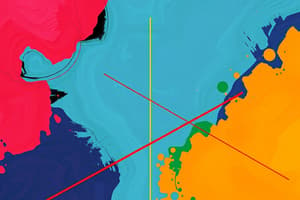Podcast
Questions and Answers
What does a straight Production Possibility Frontier (PPF) indicate about opportunity costs?
What does a straight Production Possibility Frontier (PPF) indicate about opportunity costs?
- Opportunity costs are always zero.
- Opportunity costs increase as production increases.
- Opportunity costs vary significantly between goods.
- Opportunity costs are constant to produce either good. (correct)
Which of the following best describes the concept of 'efficiency' in economic terms?
Which of the following best describes the concept of 'efficiency' in economic terms?
- Utilizing resources to maximize the production of goods or services. (correct)
- Achieving equal distribution of income among all individuals.
- Using resources to produce the least amount of goods.
- Minimizing waste by reducing the production of certain goods.
What is the main principle of Adam Smith's Invisible Hand Theory?
What is the main principle of Adam Smith's Invisible Hand Theory?
- Government intervention is necessary to ensure market efficiency.
- Self-interest is detrimental to social well-being.
- Markets operate best under strict regulatory conditions.
- Individuals pursuing self-interest can lead to societal benefits. (correct)
In the circular flow model, what role do households play in the factor market?
In the circular flow model, what role do households play in the factor market?
What is a disadvantage of a command economy?
What is a disadvantage of a command economy?
Flashcards
Increasing Opportunity Cost
Increasing Opportunity Cost
The opportunity cost of producing one good increases as more of it is produced, shown by a curved PPF.
Economic Efficiency
Economic Efficiency
The resources available in an economy are used to produce the maximum possible goods and services.
Needs
Needs
Basic necessities for survival, like food, water, and shelter.
Wants
Wants
Signup and view all the flashcards
Invisible Hand Theory
Invisible Hand Theory
Signup and view all the flashcards
Study Notes
Production Possibility Frontier (PPF)
- PPF shows the maximum combinations of goods and services an economy can produce given its resources and technology
- A straight PPF indicates constant opportunity costs, while a curved one indicates increasing opportunity costs
- Opportunity cost is what is given up to produce more of another good
- Points on the PPF are efficient, while points inside the PPF are inefficient, and points outside are unattainable
- Moving along the PPF represents trade-offs or decisions about resource allocation
Economic Needs and Wants
- Needs are essential for survival (e.g., food, shelter)
- Wants are desires to make us happy or improve our lives (e.g., luxury items)
Adam Smith's Invisible Hand Theory
- Individuals pursuing their self-interest can benefit society as a whole
- Assumes markets operate freely without significant government interference.
Laissez-Faire Principle
- Government should not interfere in economic affairs
- The market should regulate itself through supply and demand
Goods and Services
- Goods are tangible items (e.g., clothes, cars)
- Services are intangible activities (e.g., haircuts, education)
Fundamental Economic Questions
- What goods and services should be produced?
- How should these goods and services be produced?
- Who gets the goods and services that are produced?
Circular Flow Model
- Shows the flow of resources, goods, and services, and payments between households and firms
- Households provide resources (land, labor, capital) to firms and receive income in return
- Firms produce goods and services and sell them to households in exchange for payment
Studying That Suits You
Use AI to generate personalized quizzes and flashcards to suit your learning preferences.




